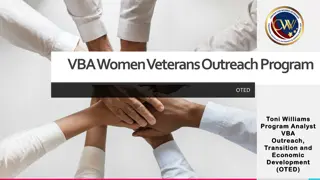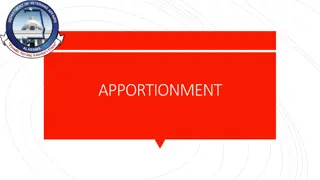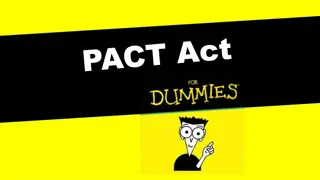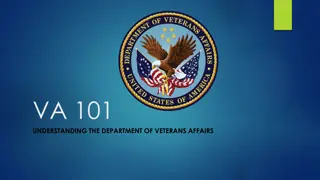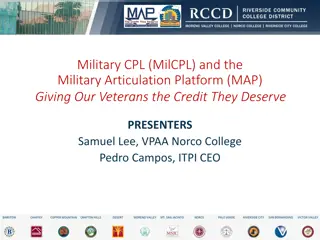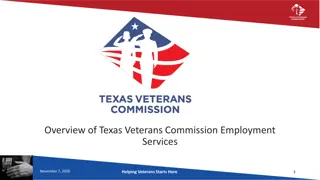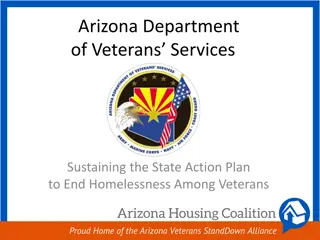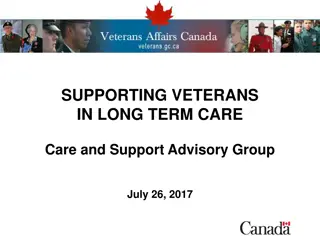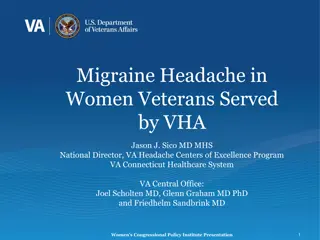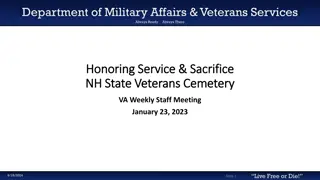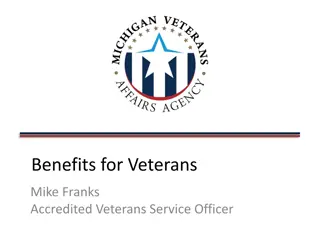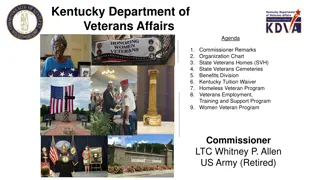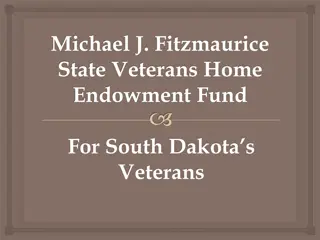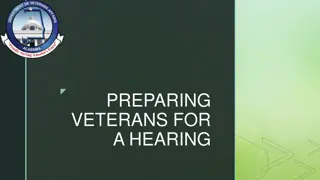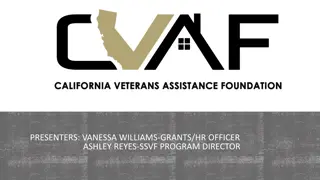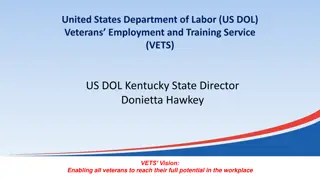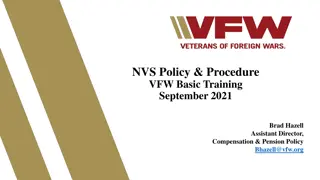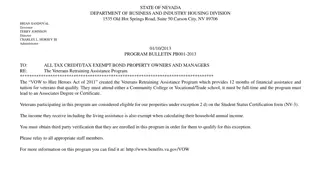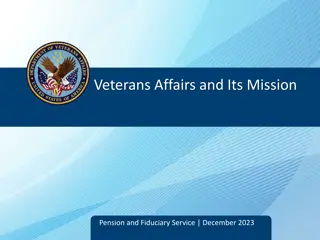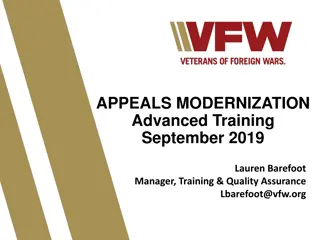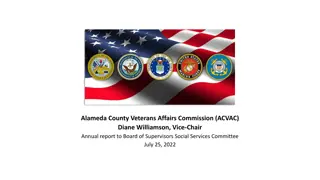Understanding the Veterans Treatment Court: A Path to Rehabilitation
Veterans Treatment Courts offer a specialized approach to help justice-involved veterans with substance dependency or mental health issues while balancing community safety. These courts aim to reduce recidivism, provide tailored support, and promote personal responsibility. By focusing on treatment and assistance, they help veterans reintegrate successfully into civilian life.
Download Presentation

Please find below an Image/Link to download the presentation.
The content on the website is provided AS IS for your information and personal use only. It may not be sold, licensed, or shared on other websites without obtaining consent from the author. Download presentation by click this link. If you encounter any issues during the download, it is possible that the publisher has removed the file from their server.
E N D
Presentation Transcript
Vigo County Veterans Treatment Court Vigo County Veterans Treatment Court
What is a Veterans Treatment Court? Hybrid, Drug and Mental Health Court. A team effort of Judge, Prosecutor, Defense Lawyers, VA, Community Health, Community Resource and Veteran Mentors. Strikes proper balance between treating the justice- involved Veteran and protecting the community.
3,000 Drug Courts across the Nation 224 Veterans Treatment Courts Serving over 11,000 Veterans 28 Veterans Treatment Courts in Indiana Drug Courts: 75 % Success Rate - - 75 % of Graduates Do Not Re-Offend 1st Veterans Court Buffalo, N.Y. Judge Russell - - 98% Success Rate! Compare: Only 30% of Prisoners succeed - - do not re-offend, after leaving prison. $20 30,000.00 to house a prisoner annually. $6-7,000.00 to treat a Veteran.
1.1 Philosophy and Purpose front is a win for the community. A specialized treatment Court is an effective solution to address the particularized needs of our Veterans involved in the court system. Helping a wounded veteran restore his dignity and get back on his feet on the home eligible veteran-defendants with substance dependency and/or mental illness or impairment that are charged with felony or misdemeanor criminal offenses. Veterans Treatment Court provides a specialized court docket that focuses on system and the veterans assistance and treatment community. Veterans Treatment Courts are a collaborative, proactive effort between the court while reducing recidivism and costs of incarceration for veteran defendants; (2) to provide an alternative to incarceration geared specifically for veterans; (3) to reduce inappropriate behavior of veterans; and (4) to assist veterans in addressing alcohol, substance abuse and/or mental health issues, providing appropriate counseling as well as educational and/or vocational development, and providing resources which can aid the veteran in leading a law- abiding civilian life. The primary goals of Veterans Treatment Court are: (1) to promote public safety
Goals and Objectives Reduce a Veteran s inappropriate behavior and recidivism through the prompt placement of eligible Veterans in the Veterans Treatment Court. Promote public safety while protecting a Veteran s due process rights through a non-adversarial approach. Support a Veteran s acceptance of personal responsibility and accountability for involvement in the court system. Provide Veterans with substance abuse, alcohol and mental health treatment. Frequently monitor the Veteran s abstinence from alcohol and drugs through testing. Provide Veterans with residential, outpatient or transitional services and academic and vocational skills improvement leading to job placement and job retention.
What is a Veteran Mentor? Acts as a resource to the Veteran client Helps Veteran clients and their families with transportation and other financial issues Served or is serving in the U.S. Military Is not a counselor, Is not a lawyer
Mentor Program Mission To ensure that every participating Veteran receives the services they require by helping them navigate the system and to act as a mentor, advocate, and ally. Program Goals 1. Help our fellow Veterans receive the services they need to reach their full potential as productive members of society. 2. Help them navigate the court system, treatment system, and the VA system. 3. Assess their needs and help them adjust back to civilian life.
Mentor Duties & Responsibilities Attend Court scheduled sessions Participate in and lead mentoring sessions when assigned by the judge Be supportive and understanding of the difficulties the Veteran participants are facing Assist Veteran participants in identifying and resolving obstacles to success in the program
Mentor Duties & Responsibilities Assist Veteran participants on how to access and navigate the Veteran s Affairs System Be supportive and helpful to other Veteran Mentors Communicate and stay close to the court coordinator and judge
Matching Policy Branch of service Occupational specialty Combat experience Similar age/gender/ethnicity Specific skill of a Mentor matched to the need of a Mentee Previous sessions where the Mentor and Mentee were matched
Mentor process: Keep it simple All Mentors are Veteran advocates You are a resource for the Vet Help Vet and family navigate systems Make sure VA Healthcare and any claims in place 75% of time, you are just a friend Not lawyers, not counselors
The Mentoring Interview 50% is just bonding Document your interview in Mentor Log for other Mentors to use in future interviews Use your Resource Book or other Mentors to help vet if problems arise Problems associated with Court or counseling are referred to Court/VA personnel
VIGO COUNTY VETERANS TREATMENT COURT WEB PAGE: https://www.vigocounty.in.gov/department/division.php?structureid=177


